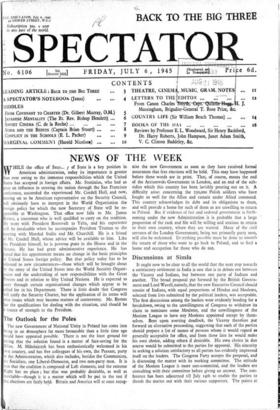The Outlook for the Poles
The new Government of National Unity in Poland has come into being in an /tmosphere far more favourable than a little time ago would have appeared possible. There is not the least ground for saying that the solution found is a matter of face-saving for the Allies. M. Mikolajczyk has been enthusiastically welcomed in his DV: n country, and has five colleagues of his own, the Peasant, party In the Administration, which also includes, besides the Communists, so: Socialists, one Liberal-Democrat, and two non-party men. It is :rue that the coalition is composed of Left elements, and the extreme Right has no place ; but that was probably desirable, as well as inevitable—though it is a matter which will be put to the test if the elections are fairly held. Britain and America will at once recog- nise the new Government as soon as they have received formal assurances that free elections will be held. This may have happened before these words are in print. That, of course, means the end of the Arciszewski Government in London, and an end of the sub- sidies which this country has been lavishly pouring out on it. A difficulty arises concerning the 250,000 Polish soldiers who have fought so well for the Allies and remain under Allied command. This country acknowledges its debt and its obligations to them, and will provide a home for such of them as are unwilling to return to Poland. But if evidence of fair and ordered government is forth- coming under the new Administration it is probable that a large proportion of the rank and file will be willing and anxious to return to their own country, where they are wanted. Many of the civil servants of the London Government, being not primarily party men, will also be welcomed. Everything possible must be done to smooth the return of those who want to go back to Poland, and to find a home and occupation for those who do not.




























 Previous page
Previous page